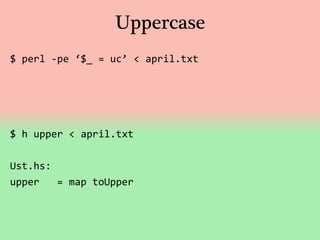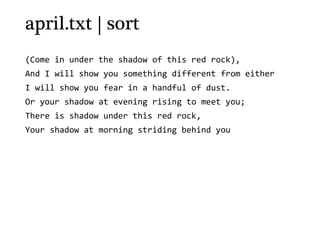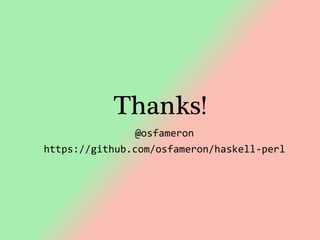This document compares and contrasts the programming languages Perl and Haskell. It discusses their differences in terms of being dynamic vs static, imperative vs functional, and weakly vs strongly typed. It provides examples of how similar tasks like mapping, doubling values, and finding lengths can be accomplished in both languages. It also explores some of the challenges that arise from Perl's scalar/list context and Haskell's use of monads and strong static types. Overall, the document examines the different philosophies behind Perl and Haskell while also showing how influences have flowed between the communities over time.



![Received Wisdom?
Perl:
dynamic
messy
simple
flexible
$?=~s/(?:[%^]+)/a/gsmx;
Haskell:
static
clean
hard
mathsy
a>>=(c@(_ _)->b’$c:[d])](https://image.slidesharecdn.com/ishaskellanacceptableperl-160419064835/85/Is-Haskell-an-acceptable-Perl-4-320.jpg)











![Map
map length,
(“Annie”, “Bob”, “Chandra”)
map length
[“Annie”, “Bob”, “Chandra”]](https://image.slidesharecdn.com/ishaskellanacceptableperl-160419064835/85/Is-Haskell-an-acceptable-Perl-16-320.jpg)
![Map
map length,
(“Annie”, “Bob”, “Chandra”)
map length
[“Annie”, “Bob”, “Chandra”]
length :: String -> Int
length “Annie” => 5
map length :: [String]->[Int]
map :: (a -> b) -> [a] -> [b]](https://image.slidesharecdn.com/ishaskellanacceptableperl-160419064835/85/Is-Haskell-an-acceptable-Perl-17-320.jpg)
![Map
map length,
(“Annie”, “Bob”, “Chandra”)
# map EXPR, LIST
# map BLOCK LIST
map { length } (…)
map length
[“Annie”, “Bob”, “Chandra”]](https://image.slidesharecdn.com/ishaskellanacceptableperl-160419064835/85/Is-Haskell-an-acceptable-Perl-18-320.jpg)
![Map
map length,
(“Annie”, “Bob”, “Chandra”)
# map EXPR, LIST
# map BLOCK LIST
map { length } (…)
map length
[“Annie”, “Bob”, “Chandra”]](https://image.slidesharecdn.com/ishaskellanacceptableperl-160419064835/85/Is-Haskell-an-acceptable-Perl-19-320.jpg)
![Map
map length,
(“Annie”, “Bob”, “Chandra”)
# map EXPR, LIST
# map BLOCK LIST
map { length } (…)
# length EXPR
# length
# If EXPR is omitted, returns
the length of $_
map length
[“Annie”, “Bob”, “Chandra”]](https://image.slidesharecdn.com/ishaskellanacceptableperl-160419064835/85/Is-Haskell-an-acceptable-Perl-20-320.jpg)
![Map
map length,
(“Annie”, “Bob”, “Chandra”)
• expression
• $_ (“it”)
• optional parameters
map length
[“Annie”, “Bob”, “Chandra”]
• function
• currying
• “lifting”](https://image.slidesharecdn.com/ishaskellanacceptableperl-160419064835/85/Is-Haskell-an-acceptable-Perl-21-320.jpg)
![Doubling
map $_ * 2, (1..5)
=> (2,4,6,8,10)
map (*2) [1..5]
=> [2,4,6,8,10]](https://image.slidesharecdn.com/ishaskellanacceptableperl-160419064835/85/Is-Haskell-an-acceptable-Perl-22-320.jpg)
![Doubling
map double($_), (1..5)
use experimental ‘signatures’;
sub double ($x) { $x * 2 }
map double [1..5]
double x = x * 2
-- or
double = (*2)](https://image.slidesharecdn.com/ishaskellanacceptableperl-160419064835/85/Is-Haskell-an-acceptable-Perl-23-320.jpg)
![Define our own ‘fmap’
fmap &double, (1..5)
sub double ($x) { $x * 2 }
sub fmap ???
map double [1..5]
double x = x * 2
-- or
double = (*2)](https://image.slidesharecdn.com/ishaskellanacceptableperl-160419064835/85/Is-Haskell-an-acceptable-Perl-24-320.jpg)
![Define our own ‘fmap’
fmap &double, (1..5)
sub double ($x) { $x * 2 }
sub fmap ($fn, @list) {
map $fn->($_), @list
}
map double [1..5]
double x = x * 2
-- or
double = (*2)](https://image.slidesharecdn.com/ishaskellanacceptableperl-160419064835/85/Is-Haskell-an-acceptable-Perl-25-320.jpg)
![Prototypes...
map _&double, (1..5)
sub double ($x) { $x * 2 }
{
no experimental 'signatures';
sub _ ($) { shift->($_) }
}
map double [1..5]
double x = x * 2
-- or
double = (*2)](https://image.slidesharecdn.com/ishaskellanacceptableperl-160419064835/85/Is-Haskell-an-acceptable-Perl-26-320.jpg)
![Reverse...
??? map reverse
[“foo”, “bar”]
=> [“oof”, “rab”](https://image.slidesharecdn.com/ishaskellanacceptableperl-160419064835/85/Is-Haskell-an-acceptable-Perl-27-320.jpg)
![Reverse...
map reverse,
(“foo”, “bar”)
=> ...
map reverse
[“foo”, “bar”]
=> [“oof”, “rab”](https://image.slidesharecdn.com/ishaskellanacceptableperl-160419064835/85/Is-Haskell-an-acceptable-Perl-28-320.jpg)
![Reverse...
map reverse,
(“foo”, “bar”)
=> () # wtf?
map reverse
[“foo”, “bar”]
=> [“oof”, “rab”](https://image.slidesharecdn.com/ishaskellanacceptableperl-160419064835/85/Is-Haskell-an-acceptable-Perl-29-320.jpg)
![Reverse...
map reverse,
(“foo”, “bar”)
=> ()
# reverse LIST
reverse (“foo”, “bar”)
=> (“bar”, “foo”)
reverse () => ()
# reverse STRING
reverse “foo” => “oof”
# reverse ($_)
map reverse
[“foo”, “bar”]
=> [“oof”, “rab”](https://image.slidesharecdn.com/ishaskellanacceptableperl-160419064835/85/Is-Haskell-an-acceptable-Perl-30-320.jpg)
![Reverse...
map scalar reverse,
(“foo”, “bar”)
=> (“oof”, “rab”)
map reverse
[“foo”, “bar”]
=> [“oof”, “rab”](https://image.slidesharecdn.com/ishaskellanacceptableperl-160419064835/85/Is-Haskell-an-acceptable-Perl-31-320.jpg)
![Reverse...
map scalar reverse,
(“foo”, “bar”)
=> (“oof”, “rab”)
• map is really concatMap!
map reverse
[“foo”, “bar”]
=> [“oof”, “rab”](https://image.slidesharecdn.com/ishaskellanacceptableperl-160419064835/85/Is-Haskell-an-acceptable-Perl-32-320.jpg)
![concatMap vs map
map {$_,$_} (1..3)
=> (1,1,2,2,3,3)
map (x->[x,x]) [1..3]
=> [[1,1],[2,2],[3,3]]](https://image.slidesharecdn.com/ishaskellanacceptableperl-160419064835/85/Is-Haskell-an-acceptable-Perl-33-320.jpg)
![concatMap vs map
map {$_,$_} (1..3)
=> (1,1,2,2,3,3)
concatMap (x->[x,x]) [1..3]
=> [1,1,2,2,3,3]](https://image.slidesharecdn.com/ishaskellanacceptableperl-160419064835/85/Is-Haskell-an-acceptable-Perl-34-320.jpg)
![Reverse with concatMap
map scalar reverse,
(“foo”, “bar”)
=> (“oof”, “rab”)
concatMap reverse
[“foo”, “bar”]
=> [“oofrab”] -- eeek!](https://image.slidesharecdn.com/ishaskellanacceptableperl-160419064835/85/Is-Haskell-an-acceptable-Perl-35-320.jpg)
![Reverse with concatMap
map scalar reverse,
(“foo”, “bar”)
=> (“oof”, “rab”)
• scalar vs list context
concatMap (return . reverse)
[“foo”, “bar”]
=> [“oof”, “rab”]
• map vs concatMap
• return (to wrap value
in e.g. list)](https://image.slidesharecdn.com/ishaskellanacceptableperl-160419064835/85/Is-Haskell-an-acceptable-Perl-36-320.jpg)
![Length of lists of lists:
??? ([1,2,3], [5,4,3,2,1])
=> (3, 5)](https://image.slidesharecdn.com/ishaskellanacceptableperl-160419064835/85/Is-Haskell-an-acceptable-Perl-37-320.jpg)
![Length of LoL
l = [[1,2,3], [5,4,3,2,1]]
map length l
=> [3, 5]
length :: [a] -> Int](https://image.slidesharecdn.com/ishaskellanacceptableperl-160419064835/85/Is-Haskell-an-acceptable-Perl-38-320.jpg)
![Length of LoL
my @l = ([1,2,3], [5,4,3,2,1]);
map length, @l
=> (16, 16) # wtf
l = [[1,2,3], [5,4,3,2,1]]
map length l
=> [3, 5]
length :: [a] -> Int](https://image.slidesharecdn.com/ishaskellanacceptableperl-160419064835/85/Is-Haskell-an-acceptable-Perl-39-320.jpg)
![Length of LoL
my @l = ([1,2,3], [5,4,3,2,1]);
map length, @l
=> (16, 16)
# length STRING
[1,2,3] => “ARRAY(0x293a1d8)”
l = [[1,2,3], [5,4,3,2,1]]
map length l
=> [3, 5]
length :: [a] -> Int](https://image.slidesharecdn.com/ishaskellanacceptableperl-160419064835/85/Is-Haskell-an-acceptable-Perl-40-320.jpg)
![Length of LoL
my @l = ([1,2,3], [5,4,3,2,1]);
map length, @l
=> (16, 16)
# length STRING
[1,2,3] => “ARRAY(0x293a1d8)”
# scalar @array
l = [[1,2,3], [5,4,3,2,1]]
map length l
=> [3, 5]
length :: [a] -> Int](https://image.slidesharecdn.com/ishaskellanacceptableperl-160419064835/85/Is-Haskell-an-acceptable-Perl-41-320.jpg)
![Length of LoL
my @l = ([1,2,3], [5,4,3,2,1]);
map scalar, @l
=> ([1,2,3], [5,4,3,2,1])
# [1,2,3] is already scalar!
l = [[1,2,3], [5,4,3,2,1]]
map length l
=> [3, 5]
length :: [a] -> Int](https://image.slidesharecdn.com/ishaskellanacceptableperl-160419064835/85/Is-Haskell-an-acceptable-Perl-42-320.jpg)
![Length of LoL
my @l = ([1,2,3], [5,4,3,2,1]);
map scalar @$_, @l
=> (3, 5)
l = [[1,2,3], [5,4,3,2,1]]
map length l
=> [3, 5]
length :: [a] -> Int](https://image.slidesharecdn.com/ishaskellanacceptableperl-160419064835/85/Is-Haskell-an-acceptable-Perl-43-320.jpg)
![Tails
??? map tail l
=> [[2,3], [4,3,2,1]]](https://image.slidesharecdn.com/ishaskellanacceptableperl-160419064835/85/Is-Haskell-an-acceptable-Perl-44-320.jpg)
![Tails
map [ @$_[1..$#$_] ], @l
=> ([2,3], [4,3,2,1])
map tail l
=> [[2,3], [4,3,2,1]]](https://image.slidesharecdn.com/ishaskellanacceptableperl-160419064835/85/Is-Haskell-an-acceptable-Perl-45-320.jpg)
![Tails
map [ @$_[1..$#$_] ], @l
=> ([2,3], [4,3,2,1])
• Yes, I know
map tail l
=> [[2,3], [4,3,2,1]]](https://image.slidesharecdn.com/ishaskellanacceptableperl-160419064835/85/Is-Haskell-an-acceptable-Perl-46-320.jpg)
![Tails
map tail($_), @l
=> () # bah!
sub tail ($head, @tail) {
@tail
}
map tail l
=> [[2,3], [4,3,2,1]]](https://image.slidesharecdn.com/ishaskellanacceptableperl-160419064835/85/Is-Haskell-an-acceptable-Perl-47-320.jpg)
![Tails
map __&tail, @l
=> ([2,3], [4,3,2,1])
sub tail ($head, @tail) {
@tail
}
{
no experimental 'signatures';
sub _ ($) { shift->($_) }
sub __ ($) { [shift->(@$_)] }
}
map tail l
=> [[2,3], [4,3,2,1]]](https://image.slidesharecdn.com/ishaskellanacceptableperl-160419064835/85/Is-Haskell-an-acceptable-Perl-48-320.jpg)


![Example:
-- https://prime.haskell.org/wiki/Libraries/Proposals/MonadFail
import qualified Data.Map as M
en2it = M.fromList [
("hello","ciao"),
("goodbye","ciao"),
("pasta","pasta") ]
translate db k =
let v = M.lookup k db
in case v of
Nothing -> fail "No translation"
Just v' -> return v'](https://image.slidesharecdn.com/ishaskellanacceptableperl-160419064835/85/Is-Haskell-an-acceptable-Perl-51-320.jpg)
![Example:
*Main> translate en2it "hello"
"ciao"
*Main> translate en2it "hello" :: Maybe String
Just "ciao"
*Main> translate en2it "hello" :: [String]
["ciao"]
*Main> translate en2it "whipuptitude"
*** Exception: user error (No translation)
*Main> translate en2it "whipuptitude" :: Maybe String
Nothing
*Main> translate en2it "whipuptitude" :: [String]
[]](https://image.slidesharecdn.com/ishaskellanacceptableperl-160419064835/85/Is-Haskell-an-acceptable-Perl-52-320.jpg)

![Why are we* so terrified of types?
en2it :: M.Map [Char] [Char]
en2it = M.fromList [
("hello","ciao"),
("goodbye","ciao"),
("pasta","pasta") ]
translate :: (Monad m, Ord k) => M.Map k a -> k -> m a
translate db k =
let v = M.lookup k db
in case v of
Nothing -> fail "No translation"
Just v' -> return v'](https://image.slidesharecdn.com/ishaskellanacceptableperl-160419064835/85/Is-Haskell-an-acceptable-Perl-54-320.jpg)
![Why are we* so terrified of types?
en2it :: M.Map [Char] [Char]
en2it = M.fromList [
("hello","ciao"),
("goodbye","ciao"),
("pasta","pasta") ]
translate :: (Monad m, Ord k) => M.Map k a -> k -> m a
translate db k =
let v = M.lookup k db
in case v of
Nothing -> fail "No translation"
Just v' -> return v'](https://image.slidesharecdn.com/ishaskellanacceptableperl-160419064835/85/Is-Haskell-an-acceptable-Perl-55-320.jpg)

![Why are we* so terrified of types?
[4, 8, 15, 16, 23, 42] :: [Int]](https://image.slidesharecdn.com/ishaskellanacceptableperl-160419064835/85/Is-Haskell-an-acceptable-Perl-57-320.jpg)
![Type terror: undefined values
[4, 8, 15, undef, 16, 23, 42] :: [Panic!]](https://image.slidesharecdn.com/ishaskellanacceptableperl-160419064835/85/Is-Haskell-an-acceptable-Perl-58-320.jpg)

![Type terror: undefined values
-- data Maybe a = Just a | Nothing
l = map (flip Map.lookup h)
[“hello", “monad", “pasta”]
-- [Just “ciao”, Nothing, Just “pasta”]
c = catMaybes l
-- [“ciao”, “pasta”]](https://image.slidesharecdn.com/ishaskellanacceptableperl-160419064835/85/Is-Haskell-an-acceptable-Perl-60-320.jpg)
![Type terror: signal values
[1, undef, 2, “X”, 3, -5]
# positive number: record
# undef: no record found
# “string”: processing instruction
# negative number: record flagged for
deletion](https://image.slidesharecdn.com/ishaskellanacceptableperl-160419064835/85/Is-Haskell-an-acceptable-Perl-61-320.jpg)
![Type terror: signal values
records :: [Maybe Record]
records = [
Just Record (Left 1),
Nothing,
Just Record (Left 2),
Just Instruction “X”
Just Record (Left 2),
Just Record (Right 5)]
data Record =
Record (Either Int Int) | Instruction String](https://image.slidesharecdn.com/ishaskellanacceptableperl-160419064835/85/Is-Haskell-an-acceptable-Perl-62-320.jpg)

















![Data modelling
package Programme;
use Moo;
use Types::Standard
qw/ Maybe Str /;
has id => ( is => 'ro',
isa => Maybe[Str] );
has id2 => ( is => 'ro',
isa => Maybe[Str] );
package Brand;
use Moo;
extends 'Programme';
# ditto Series, Episode...
type PrimaryId = Maybe String
type AlternateId = Maybe String
data Prog = Prog
ProgType
PrimaryId AlternateId
deriving (Eq, Ord, Show)
data ProgType =
Brand |
Series |
Episode
deriving (Eq, Ord, Show)](https://image.slidesharecdn.com/ishaskellanacceptableperl-160419064835/85/Is-Haskell-an-acceptable-Perl-80-320.jpg)
![The “Database”
package Database;
use Moo;
use Types::Standard
qw/ArrayRef HashRef InstanceOf/;
has list => (
is => 'ro',
isa => ArrayRef[InstanceOf["Programme"]],
...
);
has graph => (
is => 'ro',
isa => HashRef[InstanceOf["Programme"]],
...
);
data Database = Database {
list :: [Prog],
graph :: M.Map Prog Prog
}](https://image.slidesharecdn.com/ishaskellanacceptableperl-160419064835/85/Is-Haskell-an-acceptable-Perl-81-320.jpg)
![Get Hierarchy
use experimental ‘signatures’;
sub getHierarchy($self, $prog) {
if (my $parent = $self->lookup($prog->id)) {
return ($prog, $self->getHierarchy($parent))
}
else { return $prog }
}
getHierarchy :: Database -> Prog -> [Prog]
getHierarchy db p =
let l = M.lookup p (graph db)
in case l of
Nothing -> [p]
Just (parent) -> p : (getHierarchy db parent)](https://image.slidesharecdn.com/ishaskellanacceptableperl-160419064835/85/Is-Haskell-an-acceptable-Perl-82-320.jpg)
![Get Hierarchy
use experimental ‘signatures’;
use MooX::HandlesVia;
has graph => (
is => 'ro',
isa => HashRef[InstanceOf["Programme"]],
handles_via => 'Hash',
handles => { lookup => ‘get’ }
);
sub getHierarchy($self, $prog) {
if (my $parent = $self->lookup($prog->id)) {
return ($prog, $self->getHierarchy($parent))
}
else { return $prog }
}](https://image.slidesharecdn.com/ishaskellanacceptableperl-160419064835/85/Is-Haskell-an-acceptable-Perl-83-320.jpg)

![Search for a programme
use experimental 'lexical_subs';
has list => (
is => 'ro',
isa => ArrayRef[InstanceOf["Programme"]],
handles_via => 'Array',
handles => { filter => 'grep'}
);](https://image.slidesharecdn.com/ishaskellanacceptableperl-160419064835/85/Is-Haskell-an-acceptable-Perl-85-320.jpg)

